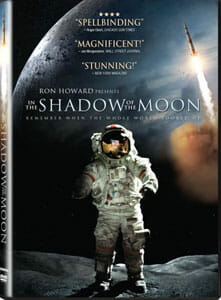In the Shadow of the Moon

Astronauts tell story of Apollo project with renewed enthusiasm
DVD Release Date: Feb. 12
Director: David Sington
Cinematographer: Clive North
Starring: Buzz Aldrin, Alan Bean, Michael Collins, Charlie Duke, Jim Lovell
Studio/Run Time: ThinkFilm, 100 mins.
I walked across the Purdue University campus one day in 1993, headed toward some lecture or quiz or lab that in retrospect seems unimportant, because assembled at that moment on the grassy lawn outside of University Hall was a mass of students and faculty waiting in the sun to hear Neil Armstrong speak. But with two roommates majoring in aeronautical engineering, I’d had my ?ll of space talk—and there was that class—so I passed up the chance to see this most famous alumnus in person.
Years later, I concluded that this decision showed a remarkable lack of maturity. Test, schmest. If there’s one person who has lived in the shadow of the moon, it’s the famously reserved—if not downright reclusive—Armstrong. He makes the occasional low-key speech, but so profound is his denial of the spotlight that David Sington’s new documentary about the Apollo project—in which astronaut after elderly astronaut steps up to the camera with a twinkle in his eye to tell his amazing story—includes nary a peep from Armstrong’s contemporary voice. It seems that he’s already said everything he has to say to the world at large, and he said it on the freaking moon.
-

-

-

-

-

-

-

-

-

-

-

-

-

-

-

-

-

-

-

-

-

-

-

-

-

-

-

-

-

-

-

-

-

-

-

-

-

-

-

-








































